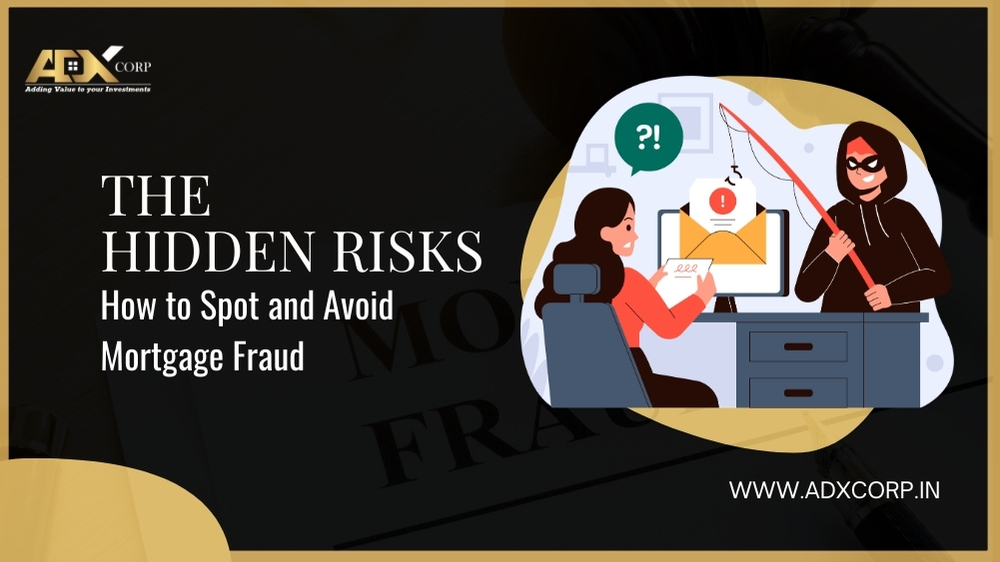
Homeownership is a dream for many, and a mortgage is often the key that unlocks that dream. However, the mortgage process can be complex, and unfortunately, there are individuals who exploit this complexity to commit mortgage fraud. This situation can lead to severe repercussions for both those who borrow and those who lend.
This blog will equip you with the knowledge to identify and avoid mortgage fraud, ensuring a safe and secure home buying experience.
What Is Mortgage Fraud?
Mortgage fraud refers to the deliberate use of false or misleading information to obtain a mortgage loan. This can involve inflating income or assets on a loan application, using straw buyers (fake borrowers), or even forging documents. Property and mortgage fraud not only harms the individual involved but can also destabilize the housing market and the financial system as a whole.
How Does Mortgage Fraud Work?
Mortgage fraud schemes can be elaborate or surprisingly simple. Here are a few common tactics:
- Income Fraud: Borrowers may inflate their income on pay stubs or tax returns to qualify for a larger loan.
- Asset Fraud: Borrowers may misrepresent the value of their assets, such as overstating the value of a down payment or collateral property.
- Straw Buyers: A straw buyer is someone who pretends to be the borrower but has no real intention of repaying the loan. The true borrower benefits from the straw buyer’s seemingly better financial qualifications.
- Appraisal Fraud: A corrupt appraiser may inflate the value of a property to help the borrower qualify for a larger loan or to facilitate a property and mortgage fraud scheme.
What Are the Most Common Mortgage Frauds?
Mortgage fraud can occur at any stage of the mortgage process. Here are some of the most common types:
- Fraud for Purchase: This occurs when a borrower falsifies information to obtain a mortgage for a property they cannot afford.
- Fraud for Profit: This involves using fraudulent means to acquire a property, often with the intention of quickly flipping it for a profit. This can lead to inflated property values and market instability.
- Foreclosure Rescue Scams: These scams target homeowners facing foreclosure, promising to save their homes for a fee but ultimately leaving them worse off financially.
What Is the Penalty for Committing Mortgage Fraud?
Mortgage fraud is a serious crime that can result in significant penalties. Depending on the severity of the offense, perpetrators could face:
- Imprisonment for several years
- Steep fines
- Difficulty obtaining future loans or mortgages
How to Avoid Mortgage Fraud?
Being aware of the risks and taking preventative steps is crucial to avoiding mortgage fraud. Here’s what you can do:
- Work with reputable lenders and real estate agents. Ask for recommendations from friends, family, or a trusted financial advisor.
- Keep your guard up when deals appear overly attractive. If someone promises to get you a significantly larger loan than other lenders, it’s likely a scam.
- Never provide false or misleading information on your loan application.
- Understand the terms of your loan agreement before signing. Feel free to ask any questions if you need clarification.
- Be cautious of unsolicited offers of help, especially from those promising to “save” your home from foreclosure.
Frequently Asked Questions (FAQs)
Q: Can I be a victim of mortgage fraud even if I'm not trying to commit fraud myself?
A: Absolutely. In some cases, straw buyers may be unaware that they are participating in a fraudulent scheme. Additionally, borrowers who are pressured to sign documents they don’t understand could also be victims of mortgage fraud.
Q: What should I do if I suspect mortgage fraud?
A: If you suspect mortgage fraud, you can report it to the Federal Trade Commission (FTC) or your local law enforcement agency. You can also report it to your lender or the Department of Housing and Urban Development (HUD).
Q: What are some additional tips for protecting myself from mortgage fraud?
A: Here are two more tips:
- Get a pre-approval for a mortgage before you start house hunting. This will give you a clear understanding of how much you can afford to borrow and prevent you from being pressured into accepting a fraudulent loan.
- Keep copies of all important documents related to your mortgage loan. This will be helpful if you need to contest any fraudulent activity.
By understanding the risks and taking preventative measures, you can protect yourself from mortgage fraud and ensure a smooth and secure home buying experience. Remember, knowledge is power!
Q: What happens if I discover mortgage fraud after I've already closed on the house?
A: If you discover mortgage fraud after closing, it’s important to act quickly. Please reach out to your lender promptly and provide them with an explanation of the situation. They may be able to help you rescind the loan or work out a modified repayment plan. You should also report the fraud to the authorities, as mentioned previously. Depending on the specifics of the situation, you may also want to consult with an attorney specializing in real estate or mortgage fraud.
Q: Is there any way to get help with the down payment on a house without risking mortgage fraud?
A: Absolutely! There are several legitimate ways to get assistance with your down payment. Here are a few options:
- Down payment assistance programs: Many government agencies and non-profit organizations offer programs that can help eligible borrowers with their down payment. These programs often have income and location restrictions, so research what’s available in your area.
- Gifts from family members: Family members can gift you money towards your down payment. This can be a great option, but be sure to follow all IRS regulations regarding gift tax to avoid any complications.
- Seller concessions: In some cases, sellers may be willing to offer concessions towards closing costs, which can help free up money for your down payment.
By exploring these legitimate options, you can achieve your dream of homeownership without putting yourself at risk for mortgage fraud.
Empower yourself with knowledge! Partner with us for a secure and informed home buying experience. We’ll guide you through the process, connect you with reputable lenders, and help you achieve your dream of homeownership.
At ADX Corp, we prioritize your safety and success throughout the home buying process. If you’re seeking a trusted property advisor to guide you through this exciting journey, feel free to contact us! We offer consultations to address your needs and concerns. With our expertise, you can navigate the complexities of the market with confidence and find your dream home.

Aayush Thakur
Recognized as one of Gurgaon's elite real estate consultants, Ayush Thakur has transformed the cityscape with insightful strategies, unparalleled expertise, and a keen sense of market dynamics. A trusted name in property advisory.







